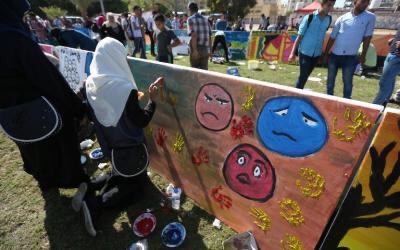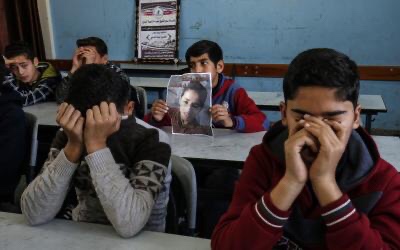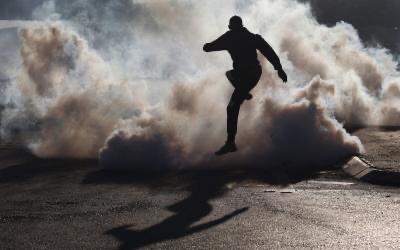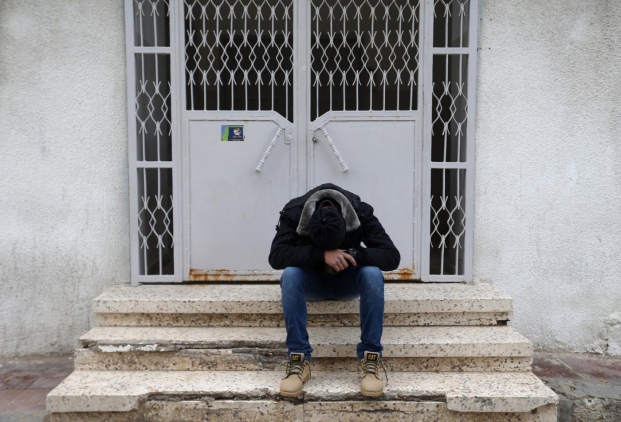Twenty-three years after he was released from an Israeli prison, Jamal Wadi still struggled with the aftermath of his experience. After three decades of suffering from severe psychological trauma and mental health issues, the 54-year-old Palestinian took his own life on 21 June.

What Palestinians experience goes beyond the PTSD label
The Gaza-based Al-Mezan Centre for Human Rights reported that at least 16 people have taken their own lives and hundreds of others attempted suicide in Gaza in the first half of 2020.
Whether influenced by economic difficulties, the traumatic impact of Israeli occupation policies or other factors, rights groups say the surge in suicide attempts is very concerning.
In 2012, the United Nations cautioned that Gaza would be “unlivable” by 2020 given the strains of the crippling siege and the devastation caused by three wars since 2007, numerous smaller military altercations and a brutally repressed protest movement.
Halfway through the year, the sad rise in suicides shows that for many, this warning has taken on another tragic meaning.
‘If I don’t die, they will kill me’
“Since we got married more than 20 years ago, I do not remember seeing Jamal emotionally and mentally stable except during the three months that followed our wedding,” Wadi’s wife, Mervat, told Middle East Eye. “He was a totally different person back then.”
Soon after their wedding in the early 1990s, Wadi was detained by Israeli forces.
“I thought his imprisonment would last for a couple of days or weeks, but he was imprisoned for seven years,” Mervat said.
Mervat started to notice changes in Wadi’s mental health during prison visits every two weeks, but did not expect that this would lead to severe psychological trauma that would change their entire life.

‘We are more tired than afraid’: Finding strength amid darkness in Gaza
“Almost every time I visited him, I would notice that he had been beaten. They used to keep him in solitary confinement for long periods of time,” she recalled. “I could see that he was not the same anymore. His eyes and the way he looked around him, he was not the same person I married a few months earlier.”
After he was released in 1997, Wadi’s family started a long journey of medical tests and hospital visits to treat what they thought was “only a trauma”, before they were informed that he was suffering from long-term mental and psychological disorders, including schizophrenia, grand mal seizures, and post-traumatic stress disorder.
Despite having found employment working for the Palestinian Authority, achieving an often elusive degree of financial stability for Gaza, Wadi struggled to adjust to life after prison.
“He always repeated that he was afraid to go back to prison, and had hallucinations that Israeli forces would break in the house and detain him at any moment,” Wadi’s brother, Sami, told MEE. “No matter how much we tried to reassure him, he would never believe us. He would always scream ‘if I don’t die, they will kill me’.
“But we did not expect such trauma would lead to suicide.”
His relatives believe Wadi took his own life as he saw it as the only way to “rest reassured that he would not return to prison” again.
“We were in complete shock. We have never expected that this would actually happen,” Sami said.
But, Sami pointed out, “Jamal is not the only case. I know many freed prisoners who also attempted to commit suicide”.
According to prisoners’ rights organisation Addameer, some 4,700 Palestinians are currently incarcerated by Israel – including 267 from the Gaza Strip.
Growing desperation
Palestinians have attributed the increase in suicide attempts to the worsening humanitarian and economic situation in the Gaza Strip.
‘No other party is responsible for the occupation’s silent killing of Palestinians’
– Sami, brother of Jamal Wadi
According to the European Union, the blockade and recurrent hostilities in the coastal enclave have weakened the local economy to the point where some 1.5 million people – around 80 percent of the total population of Gaza – remain aid dependent.
Since the imposition of the siege in 2007, the number of businesses in Gaza has decreased from 3,500 to 250, according to the Euro-Mediterranean Human Rights Monitor. Today, nearly 54 percent of families in the Gaza Strip live below the poverty line.
Measures taken to curb the spread of the coronavirus pandemic have further exacerbated the economic crisis in Gaza, with nearly 26,500 people losing their jobs in the first three months of 2020.
In the first quarter of 2020, the unemployment rate reached 46 percent, compared to around 42.7 percent in the last quarter of 2019, according to the Palestinian Central Bureau of Statistics (PCBS), revealing how dire the situation was before 2020 – a year that has seen economies across the world mark major losses.
The worrying numbers are “a testament to the desperation and severe mental health impacts of the closure”, said Nuriya Oswald, the international legal and advocacy director at Al Mezan, adding that those working in the once thriving fishing and agriculture sectors in Gaza are particularly vulnerable due to the threats of Israeli military violence and restrictions impacting their livelihoods.
Haitham Arafat, a 37-year-old father of four, has found himself in dire financial straits after being unable to repay his debts.

The occupation in my office: Speaking sense to power in therapeutic work
In early July, he attempted to set himself on fire, but was saved by passersby.
“I receive a monthly salary from the Palestinian Authority, but nothing of it remains for me and my children due to my heavy debts,” Arafat said. “I tried to work in many fields to secure another salary but I could not. I have a health problem with my hand that hospitals and doctors in Gaza could not diagnose. I cannot hold anything heavy.”
“I got fed up of feeling helpless. My children are always hungry and I cannot do anything but watch them cry,” Arafat told MEE.
Israel and its allies – including, most recently, US officials in the United Nations – have repeatedly blamed Gaza’s economic, security and psychological woes on the enclave’s de facto leadership, helmed by the Hamas movement.
But many Palestinians, including Wadi’s family, strongly reject these accusations.
“The occupation is to blame; no other party is responsible for the occupation’s silent killing of Palestinians,” Sami said. “My brother and hundreds others who committed or attempted to commit suicide once loved life. But life under occupation has been suffocating to the extent people are starting to prefer death.”
Unlivable conditions
Arafat, who was the only member of his family to survive the Sabra and Shatila massacre in 1982 as an infant, says he feels left alone to face an “unbearable situation”.
Resources exist in Gaza to help people struggling with mental health issues and suicidal thoughts – including the Gaza Community Mental Health Programme
Although there is indeed a rise in the number of suicide attempts, Dr Youssef Awadallah, a psychologist based in the Gaza Strip, told MEE that he was refraining from classifying it as a broad trend in Gaza.
“In 2019, 22 suicides were registered in all of the Strip, where some two million residents live,” he explained. “We cannot call this a phenomenon, but it is true that the dire economic and social conditions in the Strip are main factors that contribute to exacerbating the problem.”
Awadallah noted that, contrary to some perceptions, suicide attempts often stem from long periods of personal struggle.
“The idea of suicide does not just suddenly pop into someone’s head and then they commit suicide; it is a result of days and months of deep thinking, when the suicidal (person) becomes convinced that ending their life is indeed a way of relief,” he explained.
Resources exist in Gaza to help people struggling with mental health issues and suicidal thoughts – including the helpline of the Gaza Community Mental Health Programme.
While the causes of suicidal thinking are complex and varied, residents of Gaza repeatedly point to the context in which they live as contributing to people’s struggle with mental health.
“If only there was no occupation. Who would think of suicide in Gaza then?” Arafat asked. “We are capable of being independent and leading successful lives, but sleeping and waking up to the same suffocating situation is draining.”
No comments:
Post a Comment